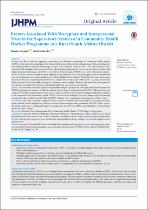Factors associated with workplace and interpersonal trust in the supervisory system of a community health worker programme in a rural South African district
Abstract
Key to effective supportive supervision, and ultimately performance of community health workers
(CHWs), is the nature of relationships in the formal health system at the coal face of programmes. The central character
and defining feature of effective relationships, in turn, is the ability to engender trust. This study describes factors
associated with workplace and interpersonal trust, the relationship between the two sets of trust factors and how this
shaped perceived performance of CHWs in ward-based outreach teams (WBOTs) in a rural South African district. : In the context of a wider study of supportive supervision of CHWs, factors recognised to be associated with
trust in the literature were studied qualitatively in Ngaka Modiri Molema district, North West Province. Focus group
discussions (FGDs) and individual interviews were conducted by the first author with CHWs (23), team leaders (12),
facility managers (10) and middle managers (5). Interviews were recorded, translated and transcribed. Perceptions of
trust factors associated with workplace and interpersonal trust were analysed thematically.

